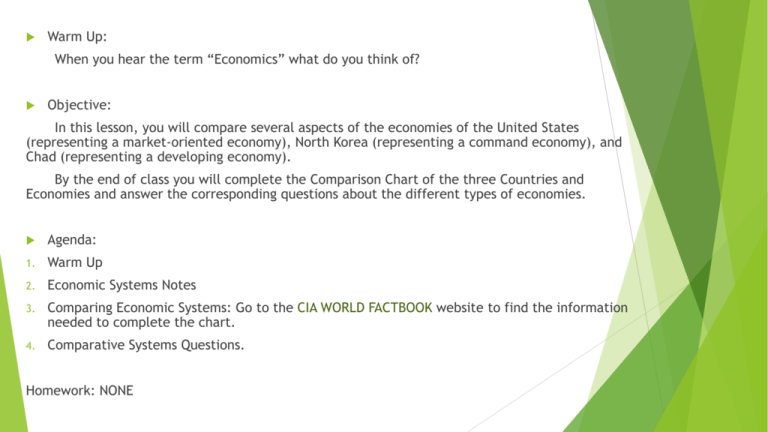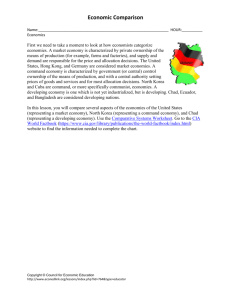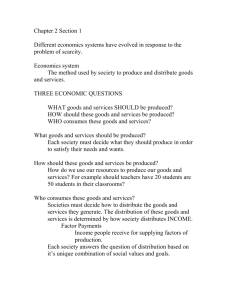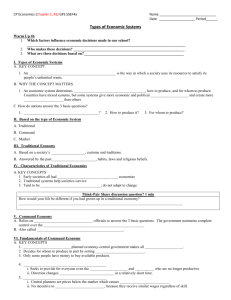Economies - mr
advertisement

Warm Up: When you hear the term “Economics” what do you think of? Objective: In this lesson, you will compare several aspects of the economies of the United States (representing a market-oriented economy), North Korea (representing a command economy), and Chad (representing a developing economy). By the end of class you will complete the Comparison Chart of the three Countries and Economies and answer the corresponding questions about the different types of economies. Agenda: 1. Warm Up 2. Economic Systems Notes 3. Comparing Economic Systems: Go to the CIA WORLD FACTBOOK website to find the information needed to complete the chart. 4. Comparative Systems Questions. Homework: NONE Market Economies A market economy is characterized by: Free Competition private ownership of production; not controlled by the government Supply and demand are responsible for the price and amount EXAMPLES: The United States, Hong Kong, and Germany are considered market economies. Command Economy A command economy is characterized by: government (or central) control ownership of the means of production – publicly owned central authority setting prices of goods and services and for most amount produced EXAMPLES: North Korea and Cuba are command, or more specifically communist, economies. Developing Economies A developing economy is: one which is not yet industrialized, but is developing Trying to turn poor country into a prosperous one Trying to improve factors like health, education, conditions and markets EXAMPLES: Chad and Bangladesh are considered developing nations/economies. OPEC- Organization of Petroleum Exporting Countries International organization headquartered in Austria Its purpose is to "coordinate and unify the petroleum policies" of its members and to "ensure the stabilization of oil markets in order to secure an efficient, economic and regular supply of petroleum to consumers, a steady income to producers, and a fair return on capital for those investing in the petroleum industry” In 2014 OPEC comprised twelve members: Algeria, Angola, Ecuador, Iran, Iraq, Kuwait, Libya, Nigeria, Qatar, Saudi Arabia, the United Arab Emirates and Venezuela WTO: World Trade Organization International organization which regulates international trade. The WTO deals with regulation of trade between participating countries by providing a rules for negotiating fair trade agreements and settling disputes (arguments) Warm Up: How does North Korea’s command economy and isolation from most of the world affect its citizens? Use your economic chart to help you answer this question. Objective: Students will learn about specific economic terms and how they help measure economic systems and will review the different types of economic and government systems discussed in previous lessons. By the end of the class students will have completed most of the government and economies 48 question study guide to prepare them for a test next class. Agenda: 1. Warm Up 2. Review Economic Systems Chart/Questions (collect) 3. Study Guide for Test – READ PAGES 73-82 and answer the corresponding questions. Homework: COMPLETE ANY MAKE UP WORK FOR THIS UNIT (DUE FRIDAY), COMPLETE STUDY GUIDE, TEST FRIDAY Warm Up: Why do countries trade? What are the advantages and disadvantages to trade? Objective: Students will test their knowledge on different government and economic systems through multiple choice, short answer and extended response questions. Agenda: 1. Warm Up 2. Collect all Gov’t, Econ and Study Guide work 3. Test Homework: NONE.





